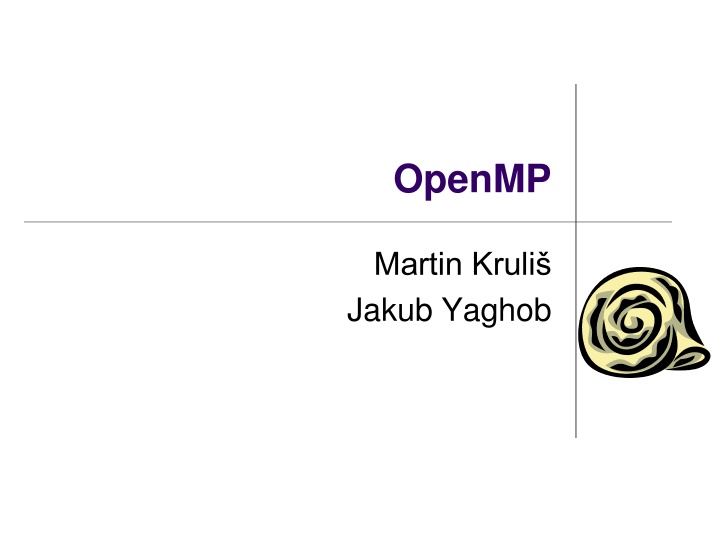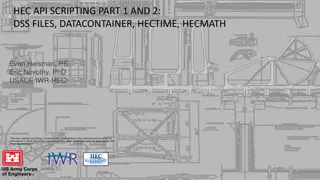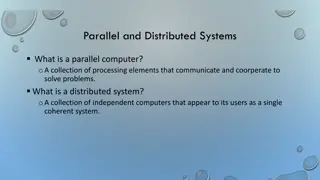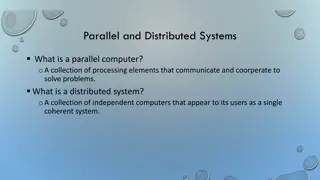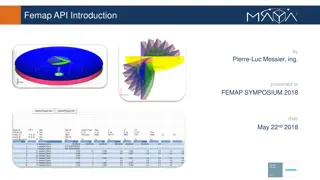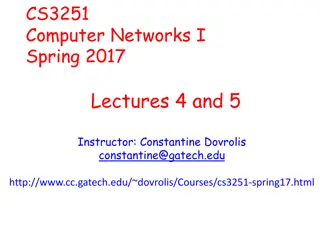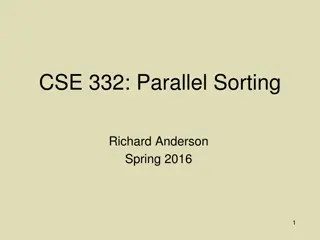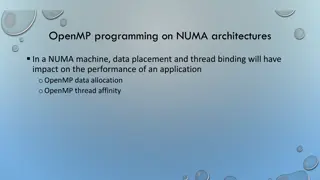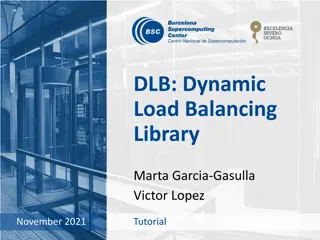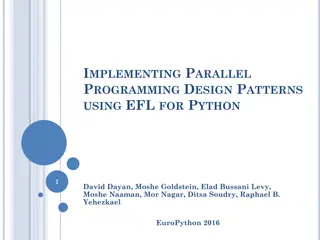Introduction to OpenMP: A Parallel Programming API
OpenMP, an API for multi-threaded, shared memory parallelism, is supported by compilers like C/C++ and Fortran. It consists of compiler directives, runtime library resources, and environment variables. The history spans various specification versions, with features like tasks, SIMD, and memory models introduced over the years. The execution model involves team of threads and nested fork/joins. The memory model ensures relaxed consistency and shared memory access. Pragmas and directives play a vital role in defining parallel regions and synchronization.
Download Presentation

Please find below an Image/Link to download the presentation.
The content on the website is provided AS IS for your information and personal use only. It may not be sold, licensed, or shared on other websites without obtaining consent from the author.If you encounter any issues during the download, it is possible that the publisher has removed the file from their server.
You are allowed to download the files provided on this website for personal or commercial use, subject to the condition that they are used lawfully. All files are the property of their respective owners.
The content on the website is provided AS IS for your information and personal use only. It may not be sold, licensed, or shared on other websites without obtaining consent from the author.
E N D
Presentation Transcript
OpenMP Martin Kruli Jakub Yaghob
About OpenMP (http://www.openmp.org) API for multi-threaded, shared memory parallelism Supported directly by compilers C/C++ and Fortran Activated by compiler directive (e.g., g++ -fopenmp) Three components Compiler directives (pragmas) Runtime library resources (functions) Environment variables (defaults, runtime configuration)
History Specification versions 1.0 C/C++ and FORTRAN versions (1997-1998) 2.0 C/C++ and FORTRAN versions (2000-2002) Supported by MSVC 2.5 combined C/C++ and FORTRAN (2005) 3.0 tasks (2008) 3.1 additional extensions for tasks and atomics (2011) 4.0 SIMD, cancellation, array sections (2013) 4.5 Fortran 2003 (2015) Widely available (gcc 6+, Intel compilers, clang) 5.0 memory model, accelerators (GPU), unified shared memory, iterators, debugger support (2018) 5.1 full C++20 and Fortran 2008 support, C++ attributes (2020) Partial support (gcc 11, Intel compilers, clang)
Execution Model Team of threads Nested (recursive) fork/joins may be allowed optionally Fork/join model Threads allocated dynamically, but thread pool may be used to optimize management
Memory model Relaxed consistency, shared memory model Memory Storage location may by associated with one or more devices Only threads on devices may access it Thread private memory Not accessible by other threads Load/store are not guaranteed to be atomic Memory operations are considered unordered, unless some defined cases
Pragmas Basic Syntax #pragma omp directive [clause, ] Code should work without the pragmas (as serial) Pragmas may be used to Spawn a parallel region Divide workload among threads Serialize sections of code Synchronization
Directives as C++ attributes Effort to remove C++ preprocessor [[ omp :: directive( directive [clause, ] ) ]] or [[ using omp : directive( directive [clause, ] ) ]] Attribute directives that apply to the same statement are unordered Ordering can be imposed [[ omp :: sequence( [omp::]directive , [omp::]directive ) ]]
Directives as C++ attributes demo [[ omp::sequence( directive(parallel), directive(for)) ]] for(...) {} #pragma omp parallel #pragma omp for for(...) {}
Parallel Region Spawning a thread team #pragma omp parallel { int tid = omp_get_thread_num(); // use tid to do thread s bidding } Implicit barrier at the end No branching/goto-s that will cause the program to jump in/out to/of parallel blocks Regular branching or function calls are OK Spawns one thread per CPU code by default Thread index within its team (master == 0)
Variable Scope Variables Scope Private a copy per each thread Shared all threads share the same variable Synchronization may be required int x, y, id; #pragma omp parallel private(id), shared(x,y) { id = x + omp_get_thread_num(); ... }
Variable Scope Private Scope Most variables are private by default Variables declared inside the parallel block All non-static variables in called functions Values are not initialized (at the beginning and the end of the block) Except for classes (default constructor must be accessible) Other scopes and additional clauses Will be presented later
Work-sharing Constructs Divide the work in parallel block
Work-sharing Constructs For-loop #pragma omp parallel { #pragma omp for for (int i = 0; i < N; ++i) { ... } } Additional clauses of for directive schedule(strategy) scheduling (work division) static, dynamic, guided, runtime, auto collapse(n) encompass nested for-loops Spawns the threads Divide for-loop workload among the threads
Work-sharing Constructs For-loop #pragma omp ordered A block inside for-loop that must be executed in exactly the same order, as if the code was serial #pragma omp parallel for Shorthand for both creating parallel block and apply it on a parallel for-loop May have clauses applied to both parallel and for directives Probably the most often used construct in OpenMP
Work-sharing Constructs For-loop Pitfalls Use #pragma omp for outside of #pragma omp parallel block Has no effect, there is only one thread available Forgetting the for itsef #pragma omp parallel for (int i = 0; i < N; ++i) { } The entire loop is executed by ALL threads
Work-sharing Constructs Sections Independent blocks of code executed concurrently #pragma omp parallel { #pragma omp sections { #pragma omp section load_player_data(); #pragma omp section load_game_maps(); ... } }
Work-sharing Constructs Single Code executed by single thread from group #pragma omp parallel { #pragma omp for for (...) ... #pragma omp single report_progress(); Only one thread reports the progress #pragma omp for ... }
Work-sharing Constructs Synchronization Implicit barrier at the end of each construct for, sections, single nowait clause Removes the barrier
Synchronization Constructs Synchronization Directives To be used within a parallel block #pragma omp master Region being executed only by master thread Similar to #pragma omp single #pragma omp critical [name] Standard critical section with lock guard Only one thread may be in the section at a time If name is provided, all sections with the same name are interconnected (use the same lock)
Synchronization Constructs Synchronization Directives #pragma omp barrier All threads in a team must meet on a barrier #pragma omp atomic Followed by a statement like x += expr; or ++x; Allowed operations: +, *, -, /, &, ^, |, <<,or >> #pragma omp flush [memory-ordering] Make sure changes of shared variables become visible Executed implicitly for many directives barrier, critical, parallel,
Tasks Tasks Pieces of code that may be executed by a different thread (within a parallel section) #pragma omp task Additional clauses untied different thread may resume task after yield priority(p) scheduling hint depend(list) tasks that must conclude first And few other that control when and who can execute the task
Tasks Tasks Synchronization #pragma omp taskwait Wait for all child tasks (spawned in this task) #pragma omp taskyield Placed as statement inside a task The processing thread may suspend this task and pick up another task #pragma omp taskgroup Spawning thread will not continue unless all tasks in the group are completed
Data Sharing Management Data-related Clauses We already know private and shared firstprivate similar to private, but the value is initialized using the value of the main thread lastprivate value after parallel block is set to the last value, that would be computed in serial processing copyprivate used with single block, last value is broadcasted to all threads
Data Sharing Management Reduction Variable is private and reduced at the end #pragma omp ... reduction(op:list) Op represents operation (+, *, &, |, ) Each operation has its own default (e.g., + has 0) List of variables Custom reducers #pragma omp declare reduction (identifier : typename-list : combiner) [initializer-clause]
Synchronization Constructs Local Thread Storage #pragma omp threadprivate(list) Variables are made private for each thread No connection to explicit parallel block Values persist between blocks Variables must be either global or static copyin(list) clause (of parallel block) Similar to firstprivate Threadprivate variables are initialized by master value
Runtime Library Runtime Library #include <omp.h> usually required Functions void omp_set_num_threads(int threads) Set # of threads in next parallel region int omp_get_num_threads(void) Get # of threads in current team int omp_get_max_threads(void) Current maximum of threads in a parallel region
Runtime Library Functions int omp_get_thread_num(void) Current thread index within a team (master == 0) int omp_get_num_procs(void) Actual number of CPU cores (available) int omp_in_parallel(void) True, if the code is executed in parallel omp_set_dynamic(), omp_get_dynamic() Dynamic ~ whether # of threads in a block can be changed when the block is running
Runtime Library Locks Regular and nested locks omp_lock_t, omp_nest_lock_t Initialization and destruction omp_init_lock(), omp_init_nest_lock() omp_destroy_lock(), omp_destroy_nest_lock() Acquiring (blocking) and releasing omp_set_lock(), omp_unset_lock(), Acquiring the lock without blocking omp_test_lock(), omp_test_nest_lock()
Environmental Variables Environmental Variables May affect the application without recompilation OMP_NUM_THREADS Max number of threads during execution OMP_SCHEDULE Scheduling strategy for for-loop construct The loop must have the strategy set to runtime OMP_DYNAMIC Enables dynamic adjustment of threads in a block
Thread Team Configuration Actual number of threads in parallel region 1. if(condition) clause is evaluated 2. num_threads(n) clause is used if present 3. omp_set_num_threads() value is used 4. OMP_NUM_THREADS env. value is used System default (typically # of CPU cores) Affinity Whether threads are bound to CPU cores proc_bind(policy) clause OMP_PROC_BIND, OMP_PLACES 5.
Nested Parallelism Nested Parallel Blocks Implementations may not support it Must be explicitly enabled omp_set_nested(), OMP_NESTED Nesting depth may be limited omp_set_max_active_levels(), OMP_MAX_ACTIVE_LEVELS More complex to get the right thread ID omp_get_level(), omp_get_active_level(), omp_get_ancestor_thread_num()
SIMD Support SIMD Instructions Generated by compiler when possible Hints may be provided by pragmas to loops #pragma omp simd, #pragma omp for simd Important clauses safelen max. safe loop unroll width simdlen recommended loop unroll width aligned declaration about array(s) data alignment linear declaration of variables with linear relation to iteration parameter Use both SIMD and parallel for
Accelerator Support Offload Support Execute code on accelerator (GPU, FPGA, ) #pragma omp target ... Slightly more complicated Memory has to be allocated on target device And data transferred there and back Or memory has to be mapped to target device Target device may have more complex thread structure OpenMP introduce thread teams directive
